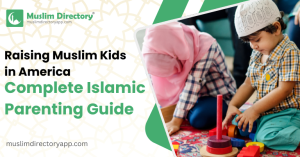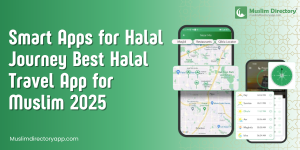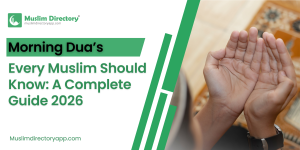Ramadan, a time of reflection, devotion, and spiritual growth is a period when we devote ourselves to amplifying our acts of worship, and seeking closeness to Allah SWT. As this sacred month approaches, preparing both spiritually and practically can enhance our experience and allow us to reach maximum benefit.
Let’s discuss ten practical ways to prepare for Ramadan, each aimed at fostering a deeper connection with Allah SWT, and spiritual growth.
1. Mental Preparation and Intentions
Mental readiness for Ramadan is even more crucial than physical preparation. This involves more than just acknowledging the obligation to fast; it’s about understanding the deeper spiritual significance. Set clear intentions for the month, aiming to grow spiritually, seek forgiveness, and strengthen your relationship with Allah.
Reflect on the purpose of fasting, which extends beyond abstaining from food and drink—it’s about self-discipline, obedience to Allah, and obtaining Taqwa. This mental groundwork helps align your actions with spiritual goals, making the month more fulfilling and transformative.
Preparing mentally also involves self-reflection. Take time to reflect on personal weaknesses and areas needing improvement. It’s an opportunity to identify habits or behaviors that may hinder spiritual growth, and contemplate strategies to overcome them. By acknowledging these aspects beforehand, you can approach Ramadan with a mindset geared toward positive change and spiritual elevation.
Lastly, mental preparation involves setting realistic expectations. Understand that Ramadan is a time for progress, not perfection. It’s natural to face challenges; the key is to approach challenges with patience and perseverance. By mentally preparing for the journey ahead, you lay the groundwork for a more fruitful and spiritually enriching experience.
2. Develop a Pre-Ramadan Routine

Preparing for Ramadan isn’t just a switch that flips on the first day; it’s a gradual process. One effective way to ease into the transition is by developing a pre-Ramadan routine. Start by adjusting your sleep schedule to wake up for Tahajjud and suhoor. This gradual shift helps your body acclimate to making better changes.
Incorporating additional acts of worship into your routine is also beneficial. Set aside time for Quranic recitation, sunnah prayers, engaging in Dhikr, and Dua. This creates a spiritual ambiance in the lead-up to Ramadan, making the transition into the month of fasting smoother.
A compilation of over 400 authentic dua that can help you better prepare and draw nearer to Allah SWT has been provided by Muslim Directory App. Additionally, reducing or eliminating habits that may distract from spiritual goals—such as excessive screen time or non-essential activities—can help redirect focus and energy towards spiritual preparation.
Furthermore, organizing daily tasks and chores beforehand can free up time during Ramadan. Planning meals in advance or preparing meal ingredients can save valuable time that can be devoted to spiritual activities. By establishing a pre-Ramadan routine, you set the stage for a more organized and spiritually fulfilling experience during the month.
3. Charity and Community Involvement
Preparing for Ramadan includes cultivating a spirit of generosity and community engagement. Allocate a portion of your wealth for charity, whether through donations to established organizations or by directly supporting individuals in need.
Engaging in acts of charity not only fulfills a fundamental aspect of Islamic teachings but also contributes to the collective welfare of the community. Look for opportunities to volunteer in local initiatives or community-driven projects, fostering a sense of unity and compassion.
Moreover, consider initiating or participating in activities for important causes, like supporting Gaza. Collaborate with friends, family, or community members to organize events aimed at supporting those less fortunate. This not only spreads goodness within the community but also instills a sense of shared responsibility and empathy, embodying the essence of Ramadan.
Additionally, actively seek out ways to support marginalized groups or individuals facing hardship. Whether it’s providing iftar meals for the homeless or assisting families in need, these acts of kindness not only benefit others but also elevate your spiritual journey by embodying the values of compassion and selflessness.
4. Digital Detox
In today’s hyper-connected world, a digital detox can significantly enhance spiritual preparedness for Ramadan. Limiting social media usage and reducing screen time creates space for increased spiritual activities.
Dedicate this extra time to reading and reflecting on the Quran, engaging in Dhikr (remembrance of Allah), or contemplating on religious teachings. Create a designated serene space for spiritual reflection, away from distractions, to facilitate deeper connection and focus during prayers and worship.
Moreover, use this time to reassess digital habits and their impact on spiritual growth. Identify and prioritize activities that bring spiritual fulfillment, replacing excessive screen time with pursuits that nurture the soul. This intentional shift allows for a more profound and meaningful connection with one’s faith during Ramadan.
Furthermore, consider engaging in additional acts of worship, such as Tahajjud (night prayers) or seeking knowledge through online lectures or religious texts. By detoxifying from digital distractions and redirecting focus towards spiritual pursuits, individuals can create an environment conducive to spiritual growth during Ramadan.
5. Set Realistic Goals

Setting achievable goals is pivotal in maximizing the benefits of Ramadan. Identify specific areas for personal growth, whether it’s memorizing Quranic verses, improving prayers, or enhancing acts of kindness. By setting realistic targets, you pave the way for a structured and purposeful journey throughout the month.
Establishing a daily routine for prayers, Quran recitation, and supplications is key. Consistency in spiritual practices is more impactful than sporadic efforts. Embrace these practices as integral parts of your daily life, allowing them to become habitual and deeply ingrained.
Furthermore, prioritize self-discipline and moderation. While it’s commendable to strive for excellence in worship, avoid overburdening yourself with unrealistic expectations. Striking a balance between spiritual aspirations and personal capabilities fosters a sustainable and fulfilling Ramadan experience.
6. Seek Knowledge and Learning Opportunities
Utilize the resources available to deepen your understanding of Islam during Ramadan. Attend lectures, seminars, or online courses conducted by knowledgeable scholars or reputable institutions. Engaging in discussions with peers or joining study circles fosters an environment conducive to learning and growth.
Moreover, dedicate time to reading and studying religious texts, focusing on topics that resonate with your spiritual journey. Reflect on the meanings and implications of Islamic teachings, seeking practical applications in daily life. This pursuit of knowledge enhances comprehension and strengthens faith, laying the groundwork for a more profound Ramadan experience.
Additionally, consider volunteering for or supporting initiatives that promote Islamic education within the community. By actively participating in educational endeavors, you contribute to the dissemination of knowledge and the nurturing of a spiritually enriched society.
7. Family and Community Bonding
Strengthening familial and community ties is integral to the spirit of Ramadan. Allocate time for family gatherings, communal prayers, and iftar with relatives and neighbors. These moments not only foster a sense of unity but also create opportunities for shared spiritual experiences.
Encourage discussions on faith-related topics within the family. Engage children in age-appropriate religious activities to instill values and deepen their understanding of Ramadan’s significance. These interactions within the family sphere create an environment where spirituality becomes a shared journey, reinforcing bonds and nurturing a collective sense of purpose.
Moreover, extend these connections beyond the immediate family by reaching out to neighbors and the wider community. Organize or participate in community-led iftar events, fostering a sense of inclusivity and solidarity. These collective gatherings embody the essence of Ramadan—a time for compassion, unity, and strengthening social bonds.
8. Plan and Prioritize Spiritual Activities

Creating a structured plan for spiritual activities during Ramadan is key to maximizing the benefits of the month. Devise a schedule that includes daily prayers, Quranic recitation, supplications, and additional acts of worship. Allocate specific time slots for each activity, ensuring consistent engagement throughout the month.
Prioritize spiritual activities by aligning them with daily routines. For example, designate time for Tahajjud and reflection during the last third of the night, while there is quietness. Incorporate acts of charity or community service into your schedule, emphasizing the importance of giving back during this blessed month.
Furthermore, consider setting aside moments for self-reflection and introspection. Evaluate your progress, identify areas for improvement, and make adjustments to your routine as needed. By planning and prioritizing spiritual activities, you create a framework that facilitates a more focused and purpose-driven Ramadan experience.
9. Self-Evaluation
Constant evaluation and improvement of yourself is fundamental to spiritual growth during Ramadan. Take time each day to introspect, assessing personal progress and the impact of spiritual practices on daily life. Acknowledge achievements, no matter how small, and express gratitude for the opportunity to experience the blessings of Ramadan.
Identify areas for improvement and contemplate strategies to overcome challenges encountered during the month. Recognize the lessons learned and the positive changes experienced, as these insights contribute to personal growth beyond Ramadan.
Moreover, as Ramadan concludes, set post-Ramadan goals to maintain the momentum gained during the month. Establish plans for continued spiritual practices and strive to incorporate the lessons learned into daily life. By engaging in this continual cycle of self-reflection and evaluation, individuals can perpetuate spiritual growth and maintain a lasting connection with their faith.
10. Physical Preparation and Hydration
Physical preparation for Ramadan involves ensuring that your body is ready for the extended hours of fasting. One crucial aspect is hydration. During non-fasting hours, prioritize drinking plenty of water and fluids to prevent dehydration.
Consuming foods that release energy slowly, such as complex carbohydrates, proteins, and fruits, during Suhoor can help sustain energy levels throughout the day.
In addition to hydration, consider incorporating light exercise into your routine. While rigorous workouts during fasting hours are not recommended, gentle physical activity, such as stretching or short walks, can help maintain fitness and energy levels.
Meal planning is another essential aspect of physical preparation. Plan balanced meals for Suhoor and Iftar that provide essential nutrients and energy. This planning can involve prepping ingredients or meals in advance to minimize cooking time during Ramadan, allowing more time for spiritual activities and rest.
By focusing on both mental and physical readiness, individuals can approach Ramadan holistically, maximizing the spiritual benefits and ensuring a healthier fasting experience.
Conclusion
Preparing for Ramadan goes beyond mere observance; it involves a comprehensive approach encompassing mental, physical, and spiritual readiness. From setting intentions and developing routines to engaging in acts of charity and nurturing communal bonds, each facet contributes to a more enriching Ramadan experience.
As Muslims worldwide anticipate the blessed month, these practical ways to prepare for Ramadan serve as a guide to enhance spirituality, foster community cohesion, and deepen the connection with Allah. Utilize Muslim Directory App’s resources to enable this time to be one of immense spiritual growth, reflection, and closeness to the Divine for all who observe this sacred month.










